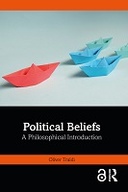Explore

Anyone who’s had an argument about politics with a friend may walk away wondering how this friend could possibly hold the beliefs they do. A few self-reflective people might even wonder about their own political beliefs after such an argument. This book is about the reasons that people have, and could have, for political beliefs: the evidence they might draw on, the psychological sources of their views, and the question of how we ought to form our political beliefs if we want to be rational.
The book’s twenty-four chapters are divided into four larger parts, which cover the following: (1) the differences between political and other types of beliefs, (2) theories of political belief formation, (3) sources of our political beliefs and how we might evaluate them, and (4) contemporary phenomena – like polarization, fake news, and conspiracy theories – related to political beliefs.
Along the way, the book addresses questions that will arise naturally for many readers, like:
Does the news you choose to watch and your own social media leave you stuck in an “information bubble”?
Are you committed to a certain ideology because of the history of your society?
Are people who believe “fake news“ always acting irrationally?
Does democracy do a good job of figuring out what’s true?
Are some political beliefs good and some evil?
As the book investigates these and other questions, it delves into technical, philosophical topics like epistemic normativity, the connection between belief and action, pragmatic encroachment, debunking arguments, and ideology critique. Chapter summaries and discussion questions will help students and all interested readers better grasp this new, important area on the border of politics and philosophy.
Key Features
Systematically covers the political turn in contemporary epistemology and integrates it with important work in other fields (like psychology and political science)
In addition to deep coverage of the nature of political belief, includes material on the ethics of political belief and how we ought to form our beliefs
Approaches topics that naturally interest students like political disagreement, fake news, conspiracy theories, and the morality of belief
Provides a Conclusion and Discussion Questions at the end of each chapter, prompting student readers to think more clearly and deeply about the material they’ve read
The Open Access version of this book, available at www.taylorfrancis.com, has been made available under a Creative Commons Attribution (CC-BY) 4.0 International license.
This book is included in DOAB.
Why read this book? Have your say.
You must be logged in to comment.
Rights Information
Are you the author or publisher of this work? If so, you can claim it as yours by registering as an Unglue.it rights holder.Downloads
This work has been downloaded 22 times via unglue.it ebook links.
- 22 - pdf (CC BY) at Unglue.it.
Keywords
- thema EDItEUR::G Reference, Information and Interdisciplinary subjects::GT Interdisciplinary studies::GTC Communication studies
- thema EDItEUR::J Society and Social Sciences::JM Psychology::JMA Psychological theory, systems, schools and viewpoints
- thema EDItEUR::J Society and Social Sciences::JM Psychology::JMH Social, group or collective psychology
- thema EDItEUR::J Society and Social Sciences::JP Politics and government
- thema EDItEUR::Q Philosophy and Religion::QD Philosophy::QDT Topics in philosophy::QDTK Philosophy: epistemology and theory of knowledge
- thema EDItEUR::Q Philosophy and Religion::QD Philosophy::QDT Topics in philosophy::QDTQ Ethics and moral philosophy
- thema EDItEUR::Q Philosophy and Religion::QD Philosophy::QDT Topics in philosophy::QDTS Social and political philosophy
Links
DOI: 10.4324/9781003355274Editions

